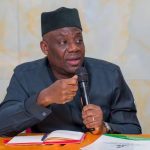Small business owners and civil society organisations have opposed the Federal Government’s plan to further increase electricity tariffs, warning that it would worsen economic hardship and cripple businesses.
The government disclosed the proposal on Thursday through the Minister of Power, Adebayo Adelabu, during the public presentation of the National Integrated Electricity Policy (NIEP) and Nigeria Integrated Resource Plan (NIRP) in Abuja.
Adelabu said the government is considering increasing tariffs for customers outside the Band-A category to improve liquidity in the Nigerian Electricity Supply Industry (NESI). He noted that the government could no longer sustain the N3 trillion power sector subsidy, with debts owed to power generation companies (GenCos) rising to N4 trillion.
“The key issue in the market is illiquidity. We will look at the tariff and see how we can improve on our modest achievement of last year. This will help us grow sector revenue and invest in revamping dilapidated infrastructure,” Adelabu said.
The NIEP and NIRP documents presented at the event outlined plans to phase out delayed electrification and self-generation by 2035, with expected investments of $29.23 billion, rising to $122 billion by 2045.
However, the proposal has sparked criticism from various groups.
The President of the Association of Small Business Owners of Nigeria (ASBON), Dr. Femi Egbesola, warned that further tariff hikes would force many small businesses to shut down.
“Majority of SMEs depend on electricity supplied by the government. Further hikes will lead to inflation, low sales due to high production costs, and the death of many micro and small businesses,” he said.
Similarly, the Education Rights Campaign (ERC) vowed to resist any tariff increase. Its National Coordinator, Hassan Taiwo, said the current power supply was unreliable, with frequent grid collapses, making any tariff hike unjustifiable.
“The government should immediately forget about increasing electricity tariffs. Power supply has not improved for most Nigerians who still suffer daily power cuts,” Taiwo said.
The Movement for Socialist Alternative (MSA) also rejected the plan, describing the Band-A tariff model as a ploy to divide consumers.
MSA’s General Secretary, Dagga Tolar, accused electricity distribution companies of raking in profits without investing in additional power generation.
“We cannot continue paying for darkness to enrich the few. The ruling class is defending private profiteers at the expense of the masses,” Tolar said.
Meanwhile, the Nigerian Electricity Regulatory Commission (NERC) has introduced the Customer Bill of Rights and Obligations to protect consumers. The bill outlines customers’ rights to transparent billing and service information, while also mandating timely bill payments and compliance with safety regulations.
NERC urged customers to familiarize themselves with the new regulations to promote transparency in the electricity market.




